HeadlinesSeptember 28, 2009
Honduran Coup Regime Imposes Media, Protest Crackdown
The Honduran coup regime has intensified its grip on power in the face of growing pressure for restoring the elected President Manuel Zelaya. On Sunday, coup leaders issued a decree granting themselves broad authority to clamp down on free speech. Under the new rules, the regime can ban protests and suspend media outlets found to have committed “disturbances of the peace.” Meanwhile, the regime also refused entry to a delegation from the Organization of American States that had come to seek a negotiated solution to the crisis. Speaking from his hideout in the Brazilian embassy, Zelaya called for a massive national protest against the coup regime.
Honduran President Manuel Zelaya: “Today is the day in which we call for peaceful resistance, for demonstrations for twenty-four continuous hours. You, my dear Hondurans, can’t lose your rights because someone, or a coup, restricts public liberties, violates human rights, murders and detains.”
Zelaya has remained in the Brazilian embassy since defiantly returning to Honduras one week ago. Coup leaders have now given Brazil a ten-day deadline to hand over Zelaya or face the embassy’s closure. Brazil has rejected the ultimatum and says Zelaya will stay as long as he needs. The coup regime issued the threat as its soldiers continued to surround the embassy and limit the delivery of supplies. On Friday, the UN Security Council passed a resolution condemning the embassy siege.
UN Ambassador Susan Rice: “They condemned acts of intimidation against the Brazilian embassy and called upon the de facto government of Honduras to cease harassing the Brazilian embassy and to provide all necessary utilities and services, including water, electricity, food and continuity of communications.”
Zelaya supporters have continued to rally despite the government crackdown. On Saturday, hundreds marched in the capital demanding the coup regime’s ouster.
Protester: “There is an excitement in our people with hope that soon we will be able to reinstate constitutional order in the country. The people are constantly, permanently and positively mobilized, and, of course, peacefully.”
US Threatens “Severe” Sanctions for Iranian Nuke Site
The US is threatening to tighten sanctions on Iran over a newly disclosed uranium enrichment site near the Iranian holy cit of Qom. On Friday, Iran acknowledged the site’s existence but said no nuclear enrichment had taken place. The Iranian government says it hasn’t violated its international commitments because it’s only required to disclose a nuclear site six months before it becomes operational. The Obama administration has warned of “severe” sanctions unless Iran suspends work on the site and allows international inspectors. In his weekly radio address, President Obama said he remains open to dialogue with Iran but warned of punitive action.
President Obama: “This is a serious challenge to the global nonproliferation regime and continues a disturbing pattern of Iranian evasion… My offer of a serious, meaningful dialogue to resolve this issue remains open. But Iran must now cooperate fully with the International Atomic Energy Agency and take action to demonstrate its peaceful intentions.”
The spat over Iran’s nuclear program comes just days before Iranian officials will meet counterparts from the US and five other countries. Earlier today, Iran also said it had successfully tested long-range missiles following a short-range missile test on Sunday.
Israeli Troops Fire on Palestinian Protests
In Israel and the Occupied Territories, four Palestinians were wounded Sunday near the Al-Aqsa Mosque in occupied East Jerusalem. Israeli police fired rubber bullets and stun grenades at Palestinians who were trying to block a group of militant Israeli settlers from entering the mosque compound. Another seven Palestinians were arrested. The attack comes two days after Israeli troops disrupted a series of protests against the West Bank separation wall. Israeli police fired tear gas at demonstrations near at least three Palestinian villages: Burin, Nil’in and Bil’in. The demonstrators had tried to remove barbed wire placed around the wall when Israeli troops fired the tear gas.
Report: Israel Conditions Palestinian Cellular Network on War Crimes Probe
In other news, the Israeli newspaper Haaretz is reporting Israel has threatened the Palestinian Authority with revoking a vital cell phone network unless the PA drops a request for an International Criminal Court probe of alleged Israeli war crimes. The PA submitted the request after a UN inquiry found Israel had committed war crimes in its attack on the Gaza Strip and recommended a potential ICC investigation. Israel has reportedly warned it could judge the PA’s request for a second cellular provider based on its willingness to withdraw the ICC demand.
12 Civilians Killed in Afghanistan
In Afghanistan, at least twelve civilians have been killed in two militant attacks. Half the victims died when Taliban forces open fired on a group of truck drivers in eastern Kunar province. A new UN report says last month was the year’s deadliest for Afghan civilians. Overall, more than 1,500 civilians have been killed so far this year, an increase of nearly 400 over the same period in 2008.
G-20 Concludes with Vague Pledges on Global Warming, Finance
The G-20 summit wrapped up in Pittsburgh Friday with pledges on a series of global issues. On climate change, world leaders vowed “strong action” but didn’t make specific commitments. The summit also called for a new era of balanced economic growth but didn’t offer much in the way of tangible steps toward that goal. On executive pay, G-20 leaders agreed to a deal that won’t cap bonuses but instead asks companies to stretch them out in deferred compensation. The final summit declaration also endorsed granting more voting rights to “underrepresented” countries at the IMF and World Bank. Around 200 people were arrested during the two-day summit. At one protest, unidentified law enforcement officers were filmed shoving a protester into a car and driving away. The officers were wearing army fatigues, but state officials say they weren’t military. The abducted protester is reportedly still behind bars.
South America-Africa Summit Launches Regional Bank, Urges Security Council Reform
As the G-20 summit ended, leaders from over sixty African and South American countries gathered in Venezuela for the second South America-Africa summit. The summit pledged to increase hemispheric cooperation and called for reforming the UN Security Council to avoid domination by the five veto-holding states. Seven South American nations signed an agreement creating a Bank of the South to fund hemispheric development projects. The bank will launch with $20 billion in start-up capital. Venezuelan President Hugo Chavez said regional cooperation would help usher in a new “multipolar” global political system.
Venezuelan President Hugo Chavez: “We can say that we are beginning this mechanism, this mechanism that seems vital, which is the union of South America with Africa. Within this newly born structure, the twenty-first century won’t be a bipolar world, it won’t be unipolar. It will be multipolar. Africa will be an important geographic, economic and social pole. And South America will be, too. We will become real powers.”
Unemployed Workers Exceed Job Openings by 6 to 1
Back in the United States, new figures show the job market is in its worst shape since the outbreak of the financial meltdown. According to the Labor Department, the number of unemployed Americans is now six times the number of available jobs. Some 14.5 million people were officially unemployed in July, compared to just 2.4 million available positions.
Kirk Sworn In as Interim Kennedy Successor
On Capitol Hill, Paul Kirk has been sworn in as the interim successor to the late Senator Edward Kennedy. Kirk will fill the seat until a special election is held in January. His swearing-in marks the first time since 1962 the Senate is without a Kennedy family member.
Watada to Be Discharged for Resisting Iraq War
The first Army officer to refuse deployment to Iraq is preparing to leave the military later this week. According to his attorney, First Lieutenant Ehren Watada will be discharged Friday “under other-than-honorable conditions.” Watada’s first court-martial ended in a mistrial two years ago. The government dropped its attempt to retry him after a federal judge ruled it would violate constitutional protections against double jeopardy.
Uninsured Ohio Student Dies After Delaying Medical Care for Swine Flu
In Ohio, a recent college graduate has died from the swine flu after delaying medical treatment because she didn’t have health insurance. Friends and family members say twenty-two-year-old Kimberly Young fell ill two weeks ago. She put off medical care out of concern she wouldn’t be able to afford it as an uninsured patient. Classmates say Young was passionate about social justice while enrolled at Ohio’s Miami University, where she earned two degrees and was involved in the groups Students for Peace and Justice and the Association of Latin American Students. She had worked two jobs since graduating last year.
Oklahoma Bombing Tapes Appear to Be Edited
A new controversy is surfacing over the disclosure of security tapes from the 1995 Oklahoma City bombings that appear to have been edited. A Salt Lake City attorney released the tapes after obtaining them under the Freedom of Information Act. The attorney, Jesse Trentadue, says tapes from four different cameras go blank right before the bombing took place. Trentadue has conducted his own inquiry into the bombings since his brother’s death in an Oklahoma City prison in 1995. Trentadue says his brother was beaten to death after FBI agents mistook him for a bombing suspect. Trentadue has accused the FBI of having prior knowledge of the bomb plot but doing little to prevent it.
Columnist William Safire Dies at 79
And the right-wing New York Times columnist William Safire has died at the age of seventy-nine. Safire spent more than thirty years at the New York Times after serving as a speech writer under President Richard Nixon.
Most popular
- 1
- 2
- 3
- 4
Non-commercial news needs your support
Please do your part today.

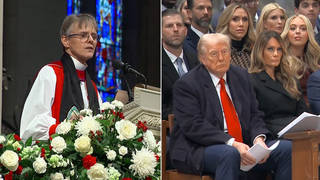
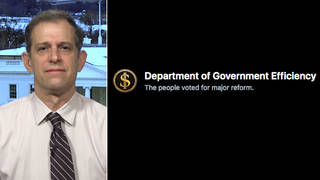
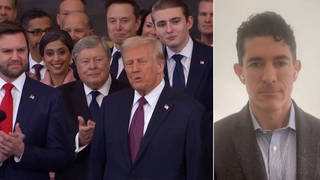
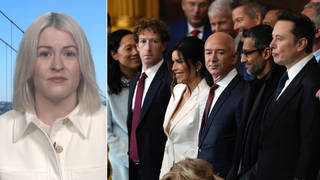





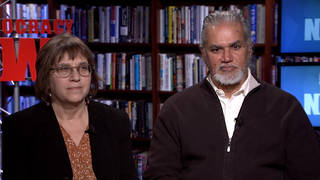
Media Options